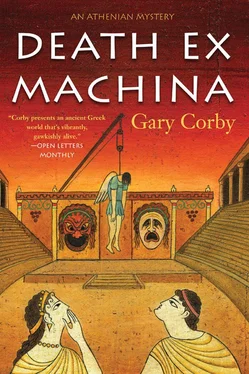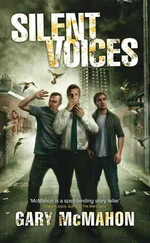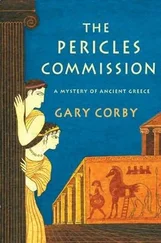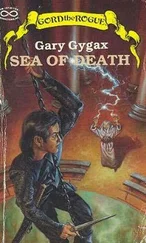Gary Corby - Death Ex Machina
Здесь есть возможность читать онлайн «Gary Corby - Death Ex Machina» весь текст электронной книги совершенно бесплатно (целиком полную версию без сокращений). В некоторых случаях можно слушать аудио, скачать через торрент в формате fb2 и присутствует краткое содержание. Год выпуска: 2015, ISBN: 2015, Издательство: Soho Press, Жанр: Исторический детектив, на английском языке. Описание произведения, (предисловие) а так же отзывы посетителей доступны на портале библиотеки ЛибКат.
- Название:Death Ex Machina
- Автор:
- Издательство:Soho Press
- Жанр:
- Год:2015
- ISBN:978-1-61695-520-5
- Рейтинг книги:3 / 5. Голосов: 1
-
Избранное:Добавить в избранное
- Отзывы:
-
Ваша оценка:
- 60
- 1
- 2
- 3
- 4
- 5
Death Ex Machina: краткое содержание, описание и аннотация
Предлагаем к чтению аннотацию, описание, краткое содержание или предисловие (зависит от того, что написал сам автор книги «Death Ex Machina»). Если вы не нашли необходимую информацию о книге — напишите в комментариях, мы постараемся отыскать её.
Death Ex Machina — читать онлайн бесплатно полную книгу (весь текст) целиком
Ниже представлен текст книги, разбитый по страницам. Система сохранения места последней прочитанной страницы, позволяет с удобством читать онлайн бесплатно книгу «Death Ex Machina», без необходимости каждый раз заново искать на чём Вы остановились. Поставьте закладку, и сможете в любой момент перейти на страницу, на которой закончили чтение.
Интервал:
Закладка:
“What?” I said, confused. “What does money have to do with this?”
The doctor pointed to his convoluted stretching device. “While your man is in this machine, no one else can use it. This is the only one in Athens. If a rich man needs it, I’ll have to swap them over.”
To our combined looks of stunned contempt, the doctor held up his hands and said defensively, “Look, I’ll keep Phellis in there as long as I can, but if someone else comes by with another broken leg-someone who can pay-then your friend’s got a problem.”
“You could build another machine,” Diotima said coldly.
“Using what for money?” the doctor asked. “These things are expensive. After I’ve paid all my costs, I barely have enough to support my family. Lady, I don’t have the money to build another.”
I looked about the comfortable house in which we stood. The courtyard was spacious. But a doctor in a shabby, poor house wouldn’t inspire confidence. His furnishings were modest, but he had a lot of children.
“You’ll get the money,” I said.
Diotima looked at me in surprise. She knew what I knew. We didn’t have such wealth.
“Very well then,” the doctor said. “Your friend stays in the machine if the money arrives. I’ll expect to see you later.”
SCENE 9
“Where are we going to find the money to help Phellis?” Diotima asked, as we returned to the theater. “We don’t even have enough money to fix the house.”
“Maybe Phellis is rich,” I said. “Perhaps he doesn’t need help.”
Diotima laughed. “You said it yourself. He’s an actor.”
“Or maybe the choregos will provide it,” I added. “After all, Phellis was injured while working for him.”
“Maybe,” Diotima said, in a tone that told me what she thought of that idea.
“Well we couldn’t leave Phellis to be discarded in the street, could we?” I said.
“No, we couldn’t, Nico, you’re right,” Diotima conceded. “Let’s ask Sophocles what he thinks.”
We arrived back at the theater in time for the end of an argument. The crew was still bickering over the failure of the god machine. Everyone stared malevolently at the stage manager.
They turned as we entered.
“How is he?” Sophocles asked at once.
I told them what the doctor had said of Phellis and his prognosis, that he would be a cripple for the rest of his life. If he lived.
The stage manager buried his head in his hands at these words. Sophocles merely nodded. Others of the crew mentioned the ghost.
“No ghost,” I told them. I held up the metal ring, which I’d taken with me. “This is the ring that held the harness to the rope. It was tampered with.”
“I told you,” said Kiron.
I nodded. “Kiron said as much when the slave found the ring. I looked, and he’s right. A segment of the ring snapped off when Phellis was in the air. But if you look carefully at the broken ends, you can see where they’ve been filed halfway through.”
That news was greeted with silence and obvious skepticism by the entire crew.
“Ghosts don’t use a metal file,” I added.
Someone muttered something about the ghost being real, unlike fanciful stories of metal files.
A long pause ensued. Then Lakon asked, “Where do we go from here, Sophocles? I suppose we replace Phellis?”
“Yes,” Sophocles said.
The crew exclaimed.
“You can’t be serious,” I said, astonished. “We have incontrovertible proof that someone is setting dangerous traps. One of you tripped over the broom-Romanos, wasn’t it?-someone poisoned the water, someone made the floor slippery. Now Phellis is crippled. You can’t continue until we catch whoever is doing this.”
Lakon answered. He said, “This is the biggest show any of us will ever play. Would you turn away from the most important job of your life?”
“No, of course not,” I said.
“Nor will I.” Lakon paused, then added, “Besides, think of the shame to Athens if we behave like cowards. We cannot abandon.”
Lakon spoke with the conviction of an actor who believed his lines. Even the crew seemed moved, who only moments ago had muttered about the ghost. Every man present had at one time or another stood in the line of battle for this city. Not one of them wanted to be called a coward by his fellow citizens. I saw several heads nod.
Sophocles saw his chance to strike. “Lakon is right,” the playwright said. “Our duty to the God and to Athens is clear. We must recast. We can’t win the contest-not now-no actor could learn the lines in the two days we have left-but we must try.”
Lakon glanced at Romanos, with an expression of calculation. Then he said with authority, “I know casting is your decision, Sophocles, but I have a suggestion.”
“Yes?” Sophocles said. “Speak up, Lakon. I’ll hear any idea that gives us a chance.”
“Then hear me now. You should cast Romanos as second actor. If you do, we can still win.”
Every head turned to Romanos. The younger actor stared at Lakon in surprise. He said, “Me?”
“Why? How?” The stage manager asked the two questions the rest of us were thinking.
“Romanos knows the second actor’s lines,” Lakon said. “I heard him once when we were practicing.”
“Is this true?” Sophocles asked.
Romanos said, “Lakon flatters me, but it’s true that I know the second actor’s part. If it will save the play, I’ll do my best.”
Sophocles shook his head. “I admire your willingness, Romanos, but that would only leave us with two actors forced to learn new lines in a hurry. You know your own lines so well, Romanos. I cannot credit you know the second actor’s part as well.”
“As it happens, Sophocles, yes I do.”
Romanos began to speak the second actor’s lines. He spoke quickly, but confidently, and he didn’t stumble. In fact, it seemed to me that Romanos spoke the lines better than Phellis himself had during the rehearsal.
Sophocles looked impressed.
“I didn’t know you had those lines so well. How do you come to have another actor’s part?” the writer asked.
“Phellis spoke them. I have an excellent memory.” Romanos made an attempt to look modest. He failed. Instead he looked confident.
Lakon said, “The third actor is easier to replace, is he not?”
We remained silent while Sophocles considered.
“Lakon’s plan is a good one,” Sophocles said after a long pause.
Heads nodded all about the theater.
Sophocles saw agreement. He said, “Then here is our plan. Romanos becomes the second actor. We replace his third actor role with a quick study. And if Dionysos grants us favor then we still have a chance. I must see Thodis the choregos for his approval-it’s his money we’re spending, after all-but he’ll agree. Thodis no more wants to bring shame to Athens than do we. Perhaps he’ll also know of a third actor we can hire on short notice.”
Lakon snorted. “All the good ones have already been hired.”
That made sense, even to me. Anyone not already cast in one of the tragedies or the comedies must have been judged second rate by experts. The glum looks of the stage manager and his crew told me they agreed.
“Does anyone know of a good actor who’s free?” Sophocles asked the assembly.
Silence.
Then Romanos raised his hand, hesitantly.
“I might know of someone,” Romanos said. “He’s a good actor.”
I could hear the “But” in his voice. So could everyone else.
“But?” Sophocles prompted.
“Well sir, he’s never played in an Athenian theater.” Romanos said it hesitantly.
Almost everyone looked dubious. I could understand their reaction. A man who had never worked the world’s most important theater was hardly the man to walk into this crisis.
Читать дальшеИнтервал:
Закладка:
Похожие книги на «Death Ex Machina»
Представляем Вашему вниманию похожие книги на «Death Ex Machina» списком для выбора. Мы отобрали схожую по названию и смыслу литературу в надежде предоставить читателям больше вариантов отыскать новые, интересные, ещё непрочитанные произведения.
Обсуждение, отзывы о книге «Death Ex Machina» и просто собственные мнения читателей. Оставьте ваши комментарии, напишите, что Вы думаете о произведении, его смысле или главных героях. Укажите что конкретно понравилось, а что нет, и почему Вы так считаете.












